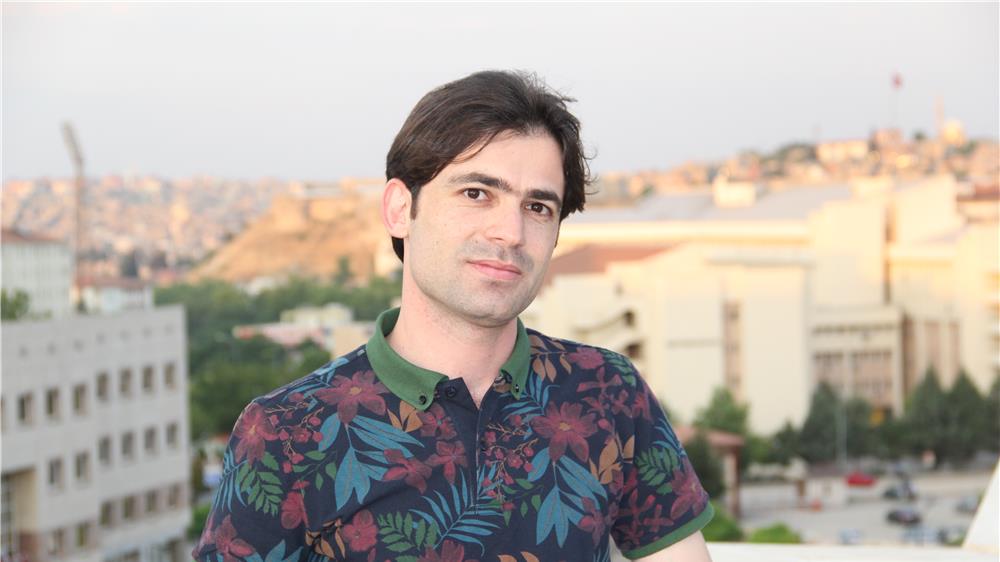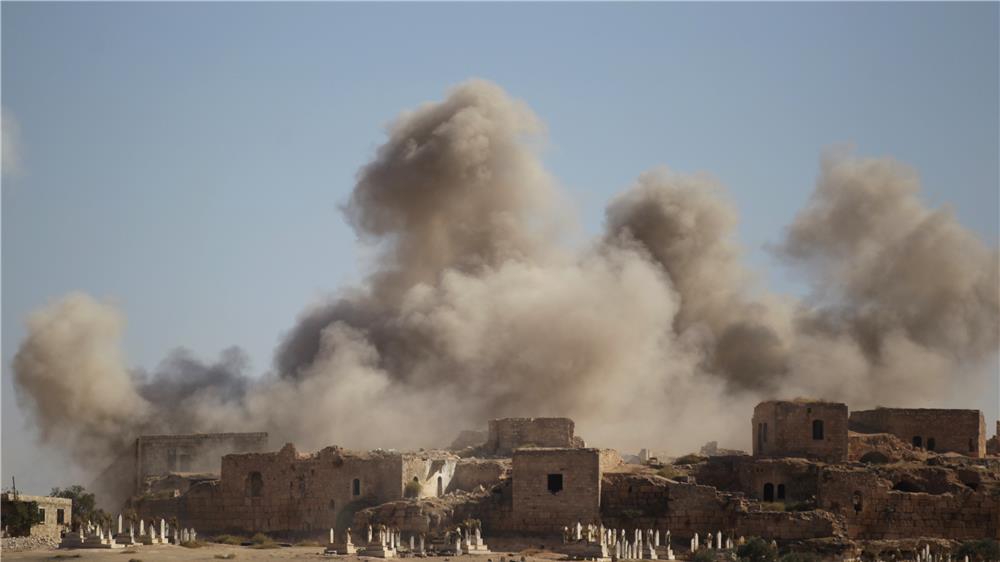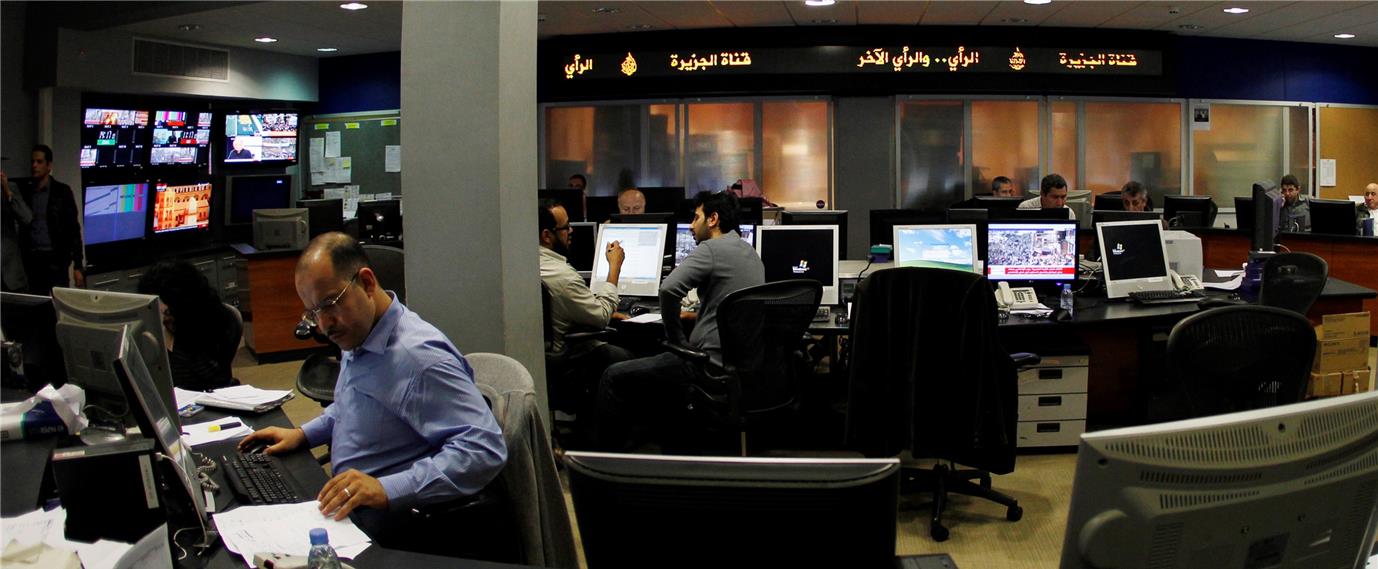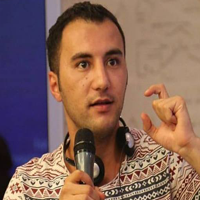يعمل الصحفي السوري محمد كناص مشرفَ تحرير لمكتب الجزيرة - سوريا، وفي كل صباح يصل فيه كناص إلى العمل بغرفة الأخبار، تتوارد إليه أخبار عاجلة عن مجزرة أو معركة في مدينة من المدن السورية. وهنا تبدأ مهمته في بلورة أسرع قصة عن الحدث، لا سيما أن الطائرات حينها لا تكون قد غادرت أجواء مكان المجزرة أو المعركة، وقد يكون المراسل على الأرض بانتظار اقتناص اللحظة الآمنة لتصوير مسرح الحدث أو الوصول إليه لتصوير وقفته في ختام التقرير (بيس تو كاميرا).
خلال ذلك الوقت، كان على الصحفي كناص أن يشبع حاجة المشاهد لمعرفة ما حدث من خلال مصادره على الأرض وما يصله من صور، فهو صحفي يعمل في غرفة أخبار تلفزيونية، وفي الوقت نفسه لديه مصادره على الأرض التي تمكّنه من إنجاز تقرير متكامل من داخل غرفة الأخبار.
يُعرف التقرير الذي يعمل عليه محمد ريثما ينهي المراسل قصّته بالتقرير الداخلي المعروف بتقرير "إن هاوس"، وهو تقرير يعدّه المحرر الموجود داخل غرفة الأخبار، وغالباً ما يستقي معلوماته وصوره من وكالات الأنباء بدرجة أولى، ثم من مصادر المحرر والمراسلين الذين يتعاونون معه على الأرض.
عن هذا الموضوع، تحاور "مجلة الصحافة" في هذا التقرير الصحفيَّ محمد كناص الذي سبق له أن عمل منتجاً وصحفياً في قناة "الجزيرة"، وقبلها في مؤسسة "النهرين" الإعلامية، كما عمل منتجا لقنوات "أورينت" و"العربية" و"الآن".

احتواء مرن للتدفق الإخباري
يقول كنّاص: "إن هذا النوع من التقارير، يساعد كثيراً في حماية المراسل على الأرض، فكثيراً ما يتعذر وصول المراسل إلى مسرح الحدث لأسباب، أمنية فتبرز هنا أهمية التقرير الداخلي الذي يشكل وجبة إخبارية كاملة المواصفات ومشبعة لحاجة المتلقي، وكثيرا ما تكون صور هذا النوع من التقارير مؤثرة، إذ يُلتقط أغلبها في اللحظات الأولى من الحدث بكاميرا مواطنين عاديين أو نشطاء، قبل أن تلتقطها كاميرا المراسل".
ويتحدث كنّاص عن حاجة غرف الأخبار للتقارير الداخلية في تغطيات الملفات الساخنة ذات الأحداث المتسارعة مثل الملف السوري، مضيفاً: "أذكر حتى قبل برود الجبهات العسكرية في عموم سوريا، أني كنت أجري تحديثات طيلة اليوم على التقرير، وهذا أمر يتعذر على المراسل على الأرض، إذ من الصعب عليه زيارة مسرح الحدث مرات عدة في اليوم، خصوصا إذا ما كان المسرح عسكريا".
ويشير إلى أن السرعة ليست وحدها الدافع لإعداد التقرير الداخلي، بل تكمن أهميته في ترميم وتوسيع العدسة حول المشهد أو الحدث.. "عندما أكون في غرفة الأخبار، وأتلقى الأخبار من مصادري المتنوعة على الأرض، وتصلني صور متنوعة أيضاً عن الموضوع نفسه، أكون قادراً على تقديم قصة أسرع من قصة المراسل، وقصة بعدسة أوسع وبكتابة مؤثرة لأن الصور التي تردني حينها تكون ساخنة ومؤثرة، ولأني أعمل في جو أكثر راحة من جو المراسل على الأرض المشوب بضغوط الوقت والخوف والتوتر، ناهيك عن انتقال مشاعر الناس إليه بحكم العدوى".
ومن هنا تكمن أهمية وجود المراسل الصحفي في غرفة الأخبار، الذي يعمل على التواصل مع مصادره والحصول على مواد تمكّنه من بناء جسم التقرير.
كسر هيمنة وكالات الأنباء
تُستقى معظم المعلومات التي يضمّنها الصحفي في التقرير الداخلي، من الأخبار والمعلومات والمواد المصورة الجاهزة التي تبثّها وكالات الأنباء المحلية والإقليمية والعالمية، أو تلك التي ترسلها إلى وسائل الإعلام التي تشترك فيها.
تساهم تلك المعلومات التي تبثّها وكالات الأنباء -إلى حدٍّ كبير- في بناء جسم التقرير، ولكنّها في المقابل تشترك في تمرير الأجندة التي تريد وكالات الأنباء تمريرها إلى الصحفي، وبذلك يتحول الأخير إلى متلقٍّ يواجه ما ترغب الوكالات في ترويجه، ويُخفى عنه ما تريد إخفاءه.
ويرى الصحفي محمد كناص أن الوكالات تكون شريكة في تحرير التقرير من خلال الصور وزواياها، ومن خلال المقابلات المرافقة للتقرير، لكنه أشار إلى أنّ الصحفي يكون غير مرتاح لما تتيحه هذه الوكالات، قائلاً: "كصحفي، بكل تأكيد سينتابك شعور بأن وكالة الأنباء قد أخفت عنك شيئاً، أو أجبرتك أن تكتب فقط لما أتاحته لك من صور".
يشعر كناص بحرية عدم التعامل مع وكالات الأنباء أحيانا، لأنه يملك مصادر، وهو يعمل في غرفة الأخبار، ويحصل على قصّته الإخبارية من خلال مصادره، ويكون حراً في التعاطي مع الصورة التي يجدها مهمة.. يقول إن "وكالات الأنباء العالمية ليس لها مراسلون على الأرض، إنما تعتمد على صحفيين مستقلين (فريلانسر)، في حين أنني كصحفي عامل في الملف السوري المعقد، أعتمد على عدة مصادر وعدة كاميرات عن الحدث الواحد، فضلا عن مراسلينا على الأرض".
وأوضح أن حضور المراسل يكسر هيمنة أي وكالة أنباء، وفي هذه النقطة تحديدا، تتشكل المعادلة التالية: "بقدر ما يكون للوسيلة انتشارها من خلال مراسليها تكون سيدة نفسها في القصة الخبرية، وبقدر ما تكون الوسيلة معتمدة على وكالة الأنباء تكون رهينة لها".وأكمل أن المراسل هو عين الوسيلة الإعلامية التي تكون أكثر اطمئنانا لقصة تصلها من مراسلها، من قصة تصلها من وكالة الأنباء.

بين الداخلي والميداني
غالباً ما يختلف الصحفيون حول مدى أهمية كل من التقرير الداخلي والتقرير الميداني. وبرأي كناص فإن لكل عمل خصوصيته، فالصحفي في غرفة الأخبار ما زال يطور من مهاراته ويستفيد مما قدمته شبكات التواصل الاجتماعي التي باتت مصدراً لا يستهان به، وكثيراً ما كان يتفوق على المراسل الميداني في صناعة العديد من القصص، إذا كان يملك قائمة ثرية من المصادر والأفكار.
يستحضر كناص أحد المواقف، عندما تلقّى خبر إسقاط الدفاعات الجوية التركية لطائرة روسية، ووصله فيديو قبل أن يصل إلى أي صحفي موجود على الأرض، وتلك الحادثة كادت تشعل حربا بين أحد أكبر بلدان حلف الناتو مع روسيا وريثة حلف وارسو سابقاً. وتابع: "حينها وصلتني الصورة من مصدر موجود على الأرض، ولا تزال تلك الصورة تُستخدم حتى اللحظة كلما ورد الحديث عن إسقاط الطائرة، إضافةً إلى أنّني أنجزت قصصاً وتقارير من مناطق النظام في سوريا (وهي مناطق يحكم النظام قبضته الأمنية عليها) بالاعتماد على مصادر فيها، وهي مناطق لا يستطيع المراسل أصلا الوصول إليها".
يرفض كنّاص الدخول في مفاضلة بين التقرير الداخلي والميداني، موضحاً أن حضور المراسل الميداني في نهاية التقرير وتوقيعه الفيزيائي عليه يعطيه مصداقية عالية جدا، في حين أن التقرير الداخلي كثيراً ما كان سباقاً ومؤثرا أكثر من تقرير المراسل على الأرض. خذ مثالا على ذلك الفيديوهات المسربة، أو صور اللحظة الأولى للقصف، أو الصور الأولى من الانفجار.. هل شاهدت تقريرا يبدأ بصور مأخوذة بكاميرا أحد رجال الدفاع المدني؟ بكل تأكيد هي صورة وفاتحة تقرير مؤثرة وغنية بالعامل الخبري، وهي صورة لا تطالها كاميرا المراسل.
أفضل من كاميرا الوكالة
يُعطي الصحفي كناص بعض النصائح في إعداد التقرير الداخلي من خلال عمله المتراكم، موضحاً أنّه يفضّله في القصص ذات الطابع الإنساني لأنه أفضل بمرات من كاميرا الوكالة. وهذا النوع من التقارير يكون مهما ومؤثراً في ملفات ومواضيع معينة، منها الملف السوري الساخن ذو الطبيعة المعقدة والمتسارعة بشكل غير متوقع، كما أنّه مهمٌّ في المواضيع التي تتوفر فيها المعلومات ولا تتوفر فيها الصور الكافية، ومهمّ في تكوين محاور البرامج، وفي التقارير التي تكون عبارة عن قراءات لمشهد أو مسرح حدث. وكثيرا ما اعتُمِد على هذا النوع من التقارير في قراءة خطابات الزعماء التي انتفضت شعوبها ضدها، وهو الملاذ الأول لأي تسريبات.
وختم بأن الاجتهاد في التقارير الداخلية مفتوح، وهو بكل تأكيد مكان رحب يتحرك فيه الصحفي لو أراد، وهو نوع يعتمد على مهارات الصحفي في التواصل وامتلاك المصادر وسرعة الحصول على المعلومة، ويتطلب قاعدة من المعلومات أو الأرشيف الخاص بالصحفي، ويحتاج إلى الصبر والقدرة على العمل تحت شبح اقتراب موعد البث.
وشدّد كناص على ضرورة أن يعزز الصحفي في غرفة الأخبار مصادره بمعلومات واردة من مراسل الوسيلة، لأن ذلك سيجعل التقرير أثرى وأكثر وتأثيرا، ومدعماً بالتفاصيل الخبرية التي يسعى المتلقي إليها لإشباع حاجته إلى المعرفة.








































